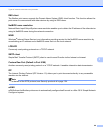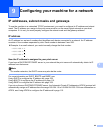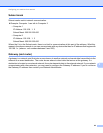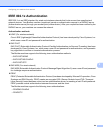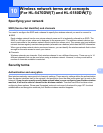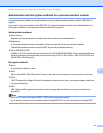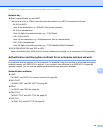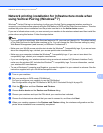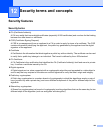
97
Wireless network terms and concepts (For HL-5470DW(T) and HL-6180DW(T))
10
Authentication and Encryption methods for a personal wireless network 10
A personal wireless network is a small network, such as a home wireless network, without IEEE 802.1x
support.
If you want to use your machine in an IEEE 802.1x supported wireless network, see Authentication and
Encryption methods for an enterprise wireless network uu page 98.
Authentication methods 10
Open system
Wireless devices are allowed to access the network without any authentication.
Shared key
A secret pre-determined key is shared by all devices that will access the wireless network.
The Brother wireless machine uses the WEP key as the pre-determined key.
WPA-PSK/WPA2-PSK
Enables a Wi-Fi Protected Access Pre-shared key (WPA-PSK/WPA2-PSK), which enables the Brother
wireless machine to associate with access points using TKIP for WPA-PSK or AES for WPA-PSK and
WPA2-PSK (WPA-Personal).
Encryption methods 10
None
No encryption method is used.
WEP
When using WEP (Wired Equivalent Privacy), the data is transmitted and received with a secure key.
TKIP
TKIP (Temporal Key Integrity Protocol) provides per-packet key mixing, a message integrity check and
rekeying mechanism.
AES
AES (Advanced Encryption Standard) provides stronger data protection by using a symmetric-key
encryption.
Note
• IEEE 802.11n does not support WEP or TKIP for the encryption method.
• If you want to connect to your wireless network using IEEE 802.11n, we recommend to choose AES.



